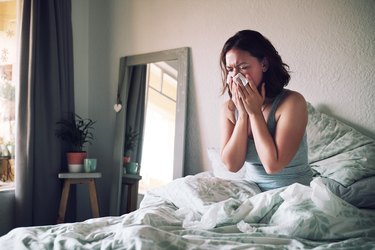
No reason you should start your day already stuffed up and sneezing. But it's first thing in the morning and already your allergy symptoms are giving you a lot of trouble.
You're not imagining things. In fact, some allergy sufferers only experience symptoms in the mornings, Robert Eitches, MD, a board-certified allergist and immunologist with Tower Allergy in Los Angeles, tells LIVESTRONG.com.
Video of the Day
Video of the Day
Think of your allergy reservoir like a well. Once it (metaphorically) fills up and overflows from allergen exposures, you get symptoms. And you can easily meet that threshold in the morning, Dr. Eitches says.
Plus, don't forget that when you're laying down, you're going to naturally feel more stuffed up.
What Causes Allergy Symptoms in the Morning
Both indoor and outdoor allergies can leave you sneezing up an a.m. storm.
1. The Cause: Your Bed
Dust mites are gross. "Dust mites are little bugs in bedding that poop. Once their poop becomes airborne, it gets into your nose and body and triggers itchy nose and eyes, congestion and asthma," Dr. Eitches says.
These microscopic bugs favor feather bedding, he says: "Feather products are like mansions to dust mites. There are lots of nooks and crannies to hang out in."
What's more, if you sleep with your pets, you may also be reacting to their dander.
Stop the sneezes: Use bedding that has a thread count of at least 400, because tightly woven fabric allows for less dust mite penetration, Dr. Eitches says.
Every three months, wash your pillow and comforter in the washing machine and dry in the dryer. You can also place your pillow in your freezer overnight (if there’s room), and then fluff in the dryer, he says. Dust mite-proof encasings can also help.
If you’re in the market for a new mattress, know that foam mattresses don’t hold dust mites. (These are often available from the direct-to-consumer, bed-in-a-box companies.)
If you know you’re allergic to pet dander, you may have to consider kicking your beloved out of your bed.
2. The Cause: Outside Exercise
Pollen counts are the highest early to mid-morning, Dr. Eitches says. Heading out on a morning run during allergy season? Walking your dog first thing? Those can all cause allergies to go haywire.
Also, realize that when you're taking deep inhales and exhales during physical activity, you're sucking in more pollen. There's also a chance that what you're reacting to is pet dander if you're in an area where people walk their dogs.
Stop the sneezes: If you feel safe at the gym, consider going back. “The gym is a relatively dust mite- and pollen-free environment,” Dr. Eitches says.
Otherwise, move your exercise indoors in your home and run the air conditioner rather than exercising by an open window.
How to Prevent Morning Allergies
You might not have to take every step mentioned above.
"It's a good idea to get tested to see what you're allergic to," Dr. Eitches says. Is it dust mites? Outdoor pollen? Dogs? "Learn what puts you over the edge so you can do some smart environmental control."
Identifying those triggers means you can avoid taking unnecessary steps if you don't have to. For instance, if you're allergic to dust mites, not dander, maybe it's still OK for your pup to spend the night with you.
Also, allergy medication might take an hour or two to kick in. And it can be a particularly miserable hour. "If you take [certain allergy medication] at night, you might find that you're a little clearer when you wake up in the morning," Dr. Eitches says.
Antihistamines like cetirizine (Zyrtec) and levocetirizine (Xyzal) can be partially sedating, and so these are good candidates for moving to nighttime use, he says.
That said, avoid any that end with a "D" (as in "Claritin-D"), because they may prevent you from falling asleep — these should be taken in the morning, Dr. Eitches says. Talk to your doctor about your symptoms and timing, and they can help you determine the right medication schedule.
Related Reading
Is this an emergency? If you are experiencing serious medical symptoms, please see the National Library of Medicine’s list of signs you need emergency medical attention or call 911.